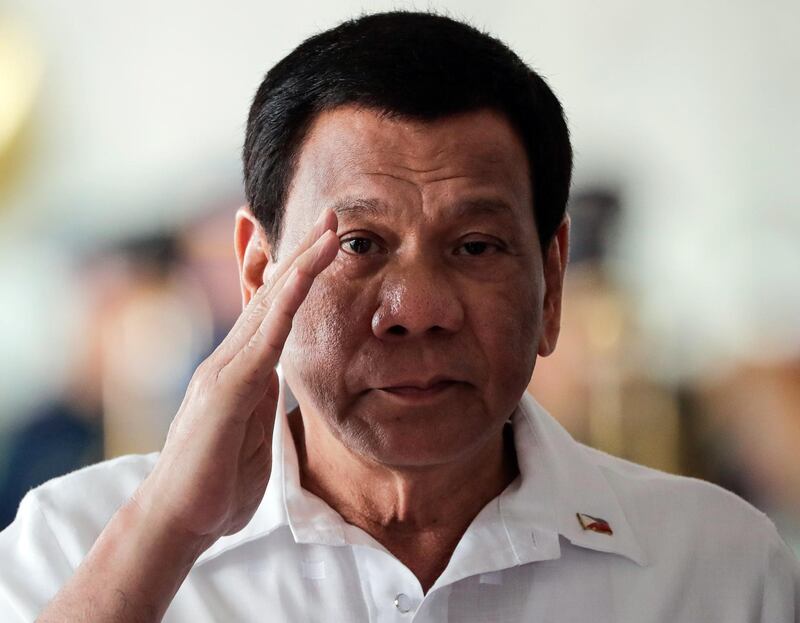Philippine President Rodrigo Duterte was set to arrive in Israel on Sunday to an anticipated hostile reception over his controversial comments about Adolf Hitler and his much-maligned war on drugs in what is the first visit there by a leader from the southeast Asian country.
Mr Duterte's visit has generated much attention, powered both by his penchant for foul-mouthed statements. Israeli officials have tried to put a positive spin on the visit in hope of boosting trade and diplomatic ties.
"We assign great importance to this visit, which symbolises the strong, warm ties between our two peoples," Israel's foreign ministry said in a statement.
The Philippine leader, accompanied by an entourage including soldiers and police, will sit down with Prime Minister Benjamin Netanyahu and hold an event with some of the thousands of Filipino migrant workers in Israel.
But the country’s media has been less forgiving. One Israeli commentator for The Times of Israel stated that “this man has no place here”.
Israeli lawyer Eitay Mack, in a written appeal to Israeli President Reuven Rivlin for him to refuse a meeting with the Philippine leader, argued that Mr Duterte “poses a threat not just to Philippine citizens but also the peace of the whole world”. The letter was signed by 24 other Israeli human rights activists.
“There is no doubt that when the international community stands idly as a leader calls for massacres, and in fact commits massacres, against specific population groups, it legitimizes other murderous leaders,” Mr Mack wrote in his appeal.
Mr Duterte will visit Israel’s national Holocaust museum, Yad Vashem, despite comments likening his war on drug dealers to Adolf Hitler’s extermination campaign of Europe’s Jews.
Although the Philippines has a special bond with Israelis for giving refuge to some 1,300 Jews fleeing the Holocaust, Mr Duterte drew global condemnation for comparing himself to the Nazi leader in 2016.
"Hitler massacred three million Jews. Now there are three million drug addicts (in the Philippines). I'd be happy to slaughter them," he said. Most mainstream historians say six million Jews died in the Holocaust.
______________
Read more:
WATCH: Philippines' Duterte watches bulldozers crush smuggled Lamborghinis and Porsches
Duterte pulls Philippines out of International Criminal Court
Duterte’s drug war is star of first Filipino drama on Netflix
______________
Mr Duterte later apologised for his remarks, which he said were aimed at critics who had likened him to the Nazi leader.
Mr Netanyahu’s government, despite Mr Duterte’s comments, has warmed to Manila after it abstained from the UN vote condemning the US for relocating its embassy from Tel Aviv to Jerusalem.
The move was widely condemned by the international community but the Philippines was one of the countries not to take a position. Palestinians seek East Jerusalem as the capital of any future state.
On Sunday, Mr Duterte said that he still advocated for a two-state solution to the decades-old conflict.
"We shall be guided by our constitution and laws as well as our international commitments in support of efforts and initiatives including the two-state solution," he told reporters.
Since entering office, he has pivoted the Philippines away from its former colonial master the United States and towards warmer diplomatic and business ties with China and Russia.
The US and Canada have both seen military hardware deals fall apart with the Philippines due to concerns over Mr Duterte's drug war. But so far sales with Israel have gone smoothly.
The Philippines emerged as a significant new customer in 2017 for Israel, with sales of radar and anti-tank equipment worth $21 million.
Manila says the trip is expected to yield agreements on defence as well as labour, which is one of the Philippines' top exports.
Some 10 million Filipinos work abroad and send home money that is a lifeline for the economy. Manila is keen to sign agreements on protections for the workers.
After visiting Israel, Mr Duterte will then head to Jordan on September 5, where he is expected to meet King Abdullah II in Amman.
Jordan hosts around 48,000 Filipino workers. But there could be tension between the pair, most likely because of the Jordanian king's family ties. One of his cousins is the former United Nations human rights chief Zeid Ra'ad Al Hussein, who Mr Duterte has directed insulting remarks towards over criticism of his anti-drug campaign.
Mr Al Hussein once suggested that the Philippine leader undergo a "psychiatric evaluation" because of threats he made towards UN officials for their condemnation of his war on drug dealers and alleged use of death squads who have been accused of carrying out extrajudicial killings.





